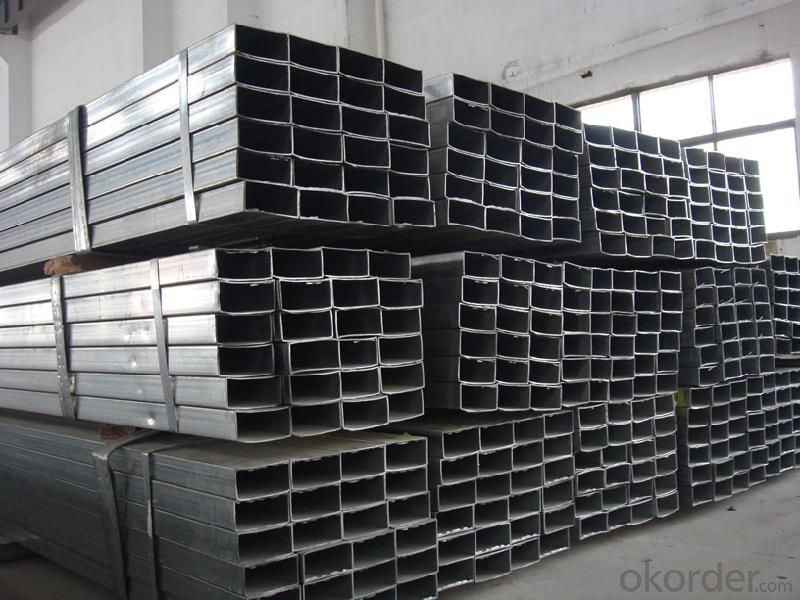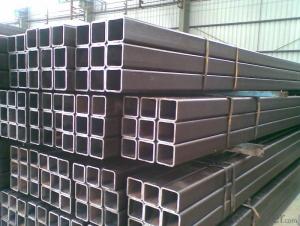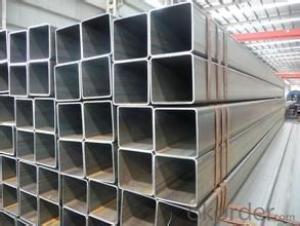Hollow Section Steel Pipe Various Size Good Quality
- Loading Port:
- Tianjin
- Payment Terms:
- TT or LC
- Min Order Qty:
- 25 m.t.
- Supply Capability:
- 10000 m.t./month
OKorder Service Pledge
OKorder Financial Service
You Might Also Like
1、Structure of Hollow Section Steel Pipe Various Size:
To be used for construction, furniture structures as well as other fabrication purposes.
2、Main Features of Hollow Section Steel Pipe Various Size:
• High manufacturing accuracy
• High strength
• Small inertia resistance
• Strong heat dissipation ability
• Good visual effect
• Reasonable price
3、Hollow Section Steel Pipe Various Size Specification:
Standard | ASTM A500, GB6728 |
Grade | A, B, C, Q195, Q235, Q215 |
Thickness | 0.6-10MM |
Section Shape | Square |
Outer Diameter | 10*10-500*500 |
Place of Origin | TIANJIN, China (Mainland) |
Secondary Or Not | Non-secondary |
Application | Hydraulic Pipe |
Technique | HOT-ROLLED |
Certification | CO, MTC, CI, PL |
Surface Treatment | factory state or painted black |
Special Pipe | |
Alloy Or Not | Non-alloy |
Length | 5-12M |
Outer Diameter | 10*10-500*500 |
1) Material: A, B, C, Q195, Q235, Q215
2) Specification range: 10*10-500*500 WT:0.6-10MM ,length:6-12m or according to the requirement of clients.
3) Excutive standards:GB,ASME API5L.ASTM A 106/A53,Despite of the above standards,we can also supply seamless steel pipe with standard of DIN,JIS,and so on,and also develop new products according to the requirements of our clients!
4) Surface:black lacquered,varnish coating or galvanized.
5) Ends:Beveled or square cut,plastic capped,painted.
6) Packing:bundles wrapped with strong steel strip,seaworthy packing.
4、Packaging & Delivery
Packaging Details: | seaworthy package,bundles wrapped with strong steel strip |
Delivery Detail: | 15-30days after received 30%TT |
5、FAQ of Hollow Section Steel Pipe Various Size:
①How is the quality of your products?
Our products are manufactured strictly according to national and internaional standard, and we take a test
on every pipe before delivered out. If you want see our quality certifications and all kinds of testing report, please just ask us for it.
Guaranteed: If products’ quality don’t accord to discription as we give or the promise before you place order, we promise 100% refund.
②How about price?
Yes, we are factory and be able to give you lowest price below market one, and we have a policy that “ for saving time and absolutely honest business attitude, we quote as lowest as possible for any customer, and discount can be given according to quantity”,if you like bargain and factory price is not low enough as you think, just don’t waste your time.Please trust the quotation we would give you, it is professional one.
6、Hollow Section Steel Pipe Various Size Images:

- Q:How much is the wall thickness standard of building 48?
- Steel tube (Steel pipe) production technology development began in the bicycle manufacturing industry, the rise of the early nineteenth Century during the oil development, the two world war ships, boilers, aircraft manufacturing, manufacturing of power boiler after the Second World War, the development of chemical industry of petroleum and natural gas drilling and transportation, will effectively promote the the yield and quality of varieties, the development of steel tube industry.
- Q:Can steel pipes be used for architectural purposes?
- Yes, steel pipes can be used for architectural purposes. They are widely used in the construction industry for structural applications such as building frames, handrails, fences, and decorative elements. Steel pipes offer strength, durability, and versatility, making them suitable for various architectural designs and applications.
- Q:Which is better, galvanized steel pipe or stainless steel?
- In rural and urban areas, it is often necessary to wash them in order to keep them in the open. In the heavily polluted industrial and coastal areas, the surface can be very dirty and even rust. But to obtain the aesthetic effect of outdoor environment, it is necessary to use nickel stainless steel. Therefore, 304 stainless steel is widely used in curtain walls, side walls, roofs and other building applications, but in corrosive industrial or marine atmospheres, it is better to use 316 stainless steel. There are several design criteria including 304 and 316 stainless steel.
- Q:Can steel pipes be bent or curved?
- Yes, steel pipes can be bent or curved using specialized equipment and techniques such as pipe bending machines or hydraulic bending.
- Q:How are steel pipes used in the construction of underground parking structures?
- Steel pipes are commonly used in the construction of underground parking structures for various purposes. They are primarily utilized for the installation of underground drainage systems, including stormwater and wastewater pipes. Steel pipes are also employed for the construction of support columns and beams, providing structural stability to the parking structure. Additionally, steel pipes are used for the installation of fire protection systems, such as sprinkler pipes, ensuring the safety of the underground parking facility.
- Q:How do steel pipes compare to other materials like PVC or copper pipes?
- Steel pipes have several advantages over other materials like PVC or copper pipes. Firstly, steel is a very strong and durable material, making steel pipes ideal for handling high-pressure applications. They can withstand extreme temperatures and are resistant to corrosion, making them suitable for both indoor and outdoor use. PVC pipes, on the other hand, are not as strong and are more prone to cracking and breaking under pressure or in extreme temperatures. Copper pipes, though durable, can be susceptible to corrosion and may require additional protective coatings. Secondly, steel pipes have a longer lifespan compared to PVC or copper pipes. They are known for their longevity and can last for several decades without needing replacement. PVC pipes, while relatively inexpensive, have a shorter lifespan and may need to be replaced more frequently. Copper pipes, though durable, can also corrode over time and may require maintenance or replacement. Another advantage of steel pipes is their ability to handle a wide range of fluids and substances. They are commonly used in industrial applications where there may be chemicals or corrosive materials present. PVC pipes, on the other hand, may not be suitable for handling certain chemicals or substances as they can react and cause damage to the pipe. Copper pipes, while generally safe for carrying water, may not be ideal for conveying certain chemicals or fluids. Additionally, steel pipes have excellent fire resistance properties. In the event of a fire, steel pipes can withstand high temperatures and maintain their structural integrity, ensuring the safety and protection of the surrounding area. PVC pipes, on the other hand, can melt or deform under high heat, potentially causing structural damage. Copper pipes, while not as prone to melting, can still be affected by extreme heat and may lose their strength. However, there are a few drawbacks to steel pipes as well. They tend to be heavier and more difficult to install compared to PVC or copper pipes. Additionally, steel pipes can be more expensive upfront, especially when compared to PVC pipes. However, considering their durability and longevity, steel pipes may offer better value in the long run. In conclusion, steel pipes offer several advantages over other materials like PVC or copper pipes. They are strong, durable, resistant to corrosion, and have a longer lifespan. They can handle high-pressure applications and a wide range of fluids, making them suitable for various industrial and commercial uses. While they may be more expensive and difficult to install, the benefits of steel pipes make them a reliable and cost-effective choice in many applications.
- Q:How do steel pipes perform in corrosive environments?
- Steel pipes perform well in corrosive environments due to their inherent resistance to corrosion. Steel is a durable and strong material that can withstand exposure to various corrosive elements such as moisture, chemicals, and saltwater. Additionally, steel pipes can be further protected through coatings or linings to enhance their resistance to corrosion, making them a reliable choice for applications in corrosive environments.
- Q:What are the different types of steel pipe supports for offshore platforms?
- There are several types of steel pipe supports commonly used for offshore platforms, including but not limited to: 1. Clamps: These are used to secure and fasten pipes to the support structure, providing stability and preventing movement. 2. Hangers: These are used to suspend pipes from the support structure, allowing for flexibility and reducing stress on the pipes. 3. Guides: These are installed to control the movement and alignment of pipes, ensuring they stay in place and prevent damage during operation. 4. Shoes: These are used to support and distribute the weight of the pipe, typically at points where the pipe intersects with the support structure. 5. Saddles: These are designed to cradle the pipe and provide support, typically used for horizontal or inclined pipes. Each type of steel pipe support serves a specific purpose in ensuring the integrity and functionality of the offshore platform's piping system.
- Q:What is the difference between steel pipes and concrete pipes?
- Steel pipes and concrete pipes differ in their composition, construction, and characteristics. Steel pipes are made from steel, whereas concrete pipes are made from a mixture of cement, sand, aggregate, and water. Steel pipes are known for their strength, durability, and resistance to corrosion, making them suitable for high-pressure applications and underground installations. Concrete pipes, on the other hand, are renowned for their affordability, ease of installation, and resistance to fire. They are commonly used in stormwater drainage systems and sewerage networks. Overall, the choice between steel pipes and concrete pipes depends on the specific requirements of the project, such as budget, load-bearing capacity, and environmental factors.
- Q:What does GALV mean in a steel tube?
- Steel tube (Steel pipe) production technology development began in the bicycle manufacturing industry, the rise of the early nineteenth Century during the oil development, the two world war ships, boilers, aircraft manufacturing, manufacturing of power boiler after the Second World War, the development of chemical industry of petroleum and natural gas drilling and transportation, will effectively promote the the yield and quality of varieties, the development of steel tube industry.
1. Manufacturer Overview |
|
|---|---|
| Location | |
| Year Established | |
| Annual Output Value | |
| Main Markets | |
| Company Certifications | |
2. Manufacturer Certificates |
|
|---|---|
| a) Certification Name | |
| Range | |
| Reference | |
| Validity Period | |
3. Manufacturer Capability |
|
|---|---|
| a)Trade Capacity | |
| Nearest Port | |
| Export Percentage | |
| No.of Employees in Trade Department | |
| Language Spoken: | |
| b)Factory Information | |
| Factory Size: | |
| No. of Production Lines | |
| Contract Manufacturing | |
| Product Price Range | |
Send your message to us
Hollow Section Steel Pipe Various Size Good Quality
- Loading Port:
- Tianjin
- Payment Terms:
- TT or LC
- Min Order Qty:
- 25 m.t.
- Supply Capability:
- 10000 m.t./month
OKorder Service Pledge
OKorder Financial Service
Similar products
New products
Hot products
Hot Searches
Related keywords






























